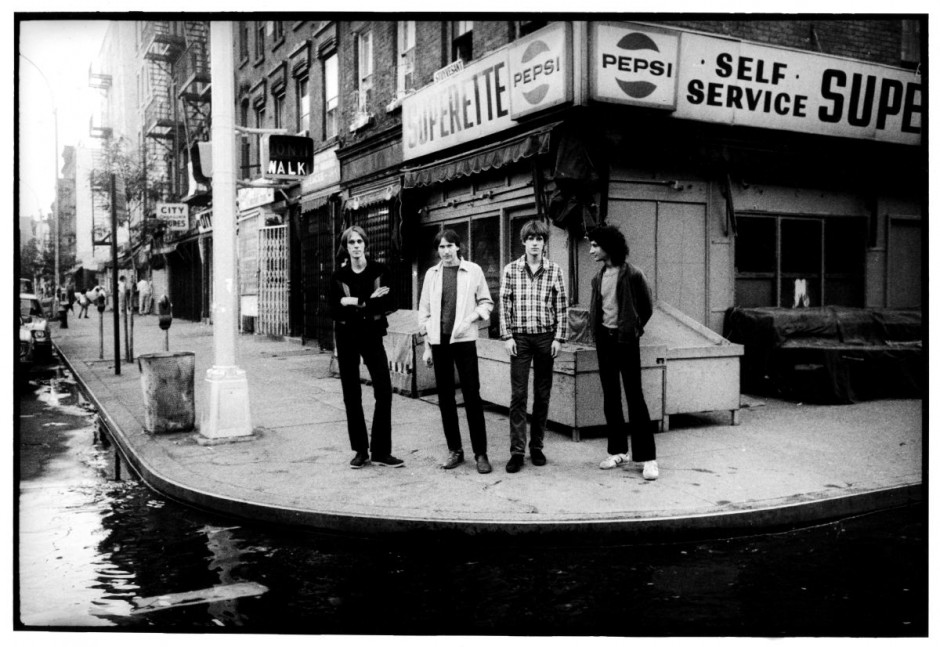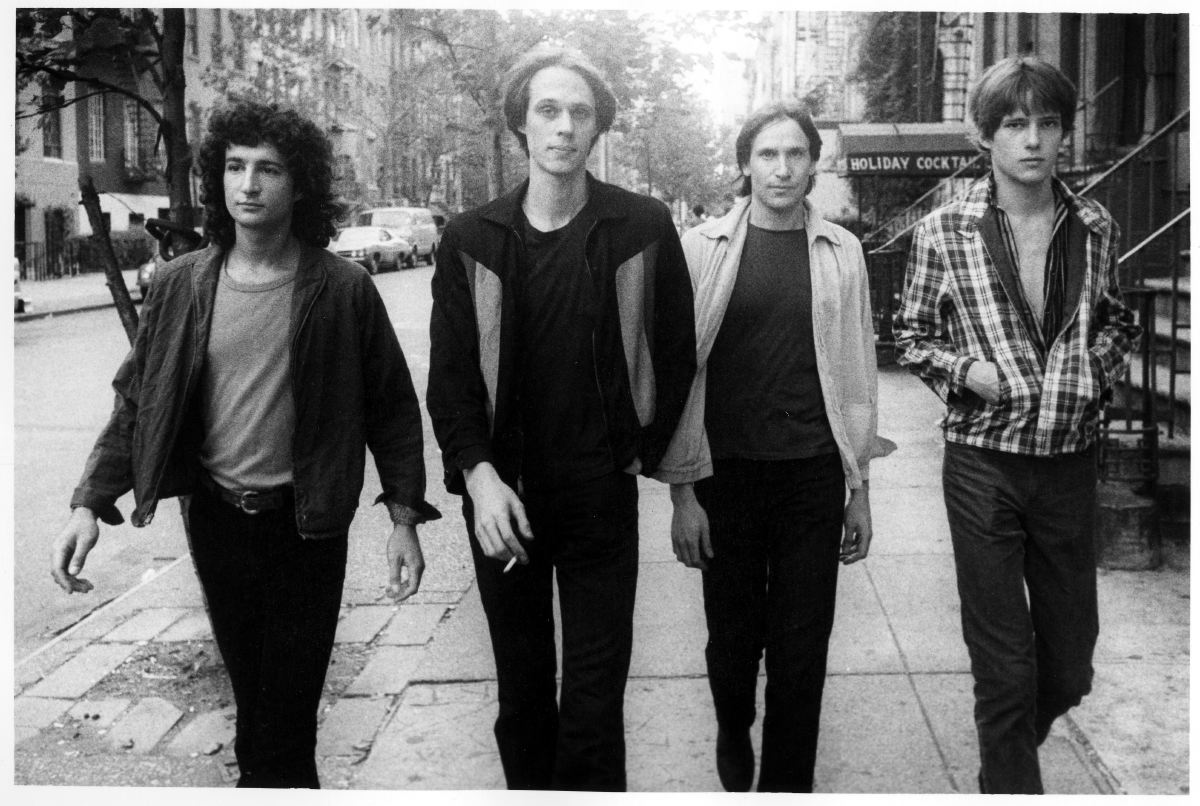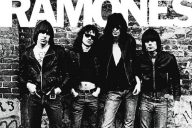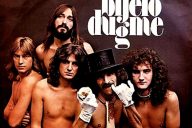In the Shadow of the Marquee Moon: The Song that Defined Television’s Rock ‘N’ Roll Legacy
Part of the mid-70s New York rock scene that spawned the likes of Blondie, The Ramones and Talking Heads, Television will be playing their critically acclaimed album Marquee Moon in Australia for the first time ever. Engel Schmidl writes.
From memory, we were going from a gig in Fitzroy to a party in St Kilda. Or was it the other way around?
It was one of those heady, balmy nights in Melbourne, when the city gives in to her carnal, tropical alter ego, lets loose her raven locks (like a hussy in a Whitesnake video), and drowns her inhibitions with a steady stream of gin and tonics.
Myles was (and still is) a drummer in a rock ‘n’ roll band. We were in his car, an early 70s Holden Kingswood station wagon (HK, HT, HG model?). It was a boss set of wheels.
Like I said, we were cruising from gig to party, drinking in the summer air: young, dumb and full of rock ‘n’ roll wonder.
Myles slipped a cassette in the tape deck. Maybe we had been listening to The Flamin’ Groovies or The Who or The Stones. That didn’t matter anymore, because now we were listening to something else, something magisterial, a song that was the sound of lightning arcing against a black ink sky.
The song went for ten minutes, but seemed to hold a lifetime within it.
I remember
how the darkness doubled
I recall
lightning struck itself.
I was listening
listening to the rain
I was hearing
hearing something else.
Once heard, Television’s ‘Marquee Moon’ is almost never forgotten. It drops its sweet rock ‘n’ roll science on the listener with the panache of a third generation subway pickpocket in a carriage full of Kansas conventioneers.
It is Television’s defining moment. The magnum opus expression of its fully realised rock ‘n’ roll psyche: Tom Verlaine and Richard Lloyd’s guitars lock in on each other’s melodic radar, Fred Smith’s bass kicks a hypnotic groove, and Billy Ficca’s rock solid drumming has just enough fills and jazzy hi-hat spills to keep any downtown Charlie Brown satisfied.
By the time ‘Marquee Moon’ played out we had reached our destination. Whether it was a party in St Kilda or Fitzroy, I can’t remember. That week, I hunted down a copy of the Marquee Moon album and played the title track to death, scarcely even skating the needle over any other track on the record.
Eventually, I listened to the rest of the album, which, make no mistakes, is brilliant. This was not a case of a one-hit wonder cossetted away on an album full of junk and filler. Songs like ‘See No Evil’, ‘Elevation’ and ‘Prove It’ all held their own as god-like songs in the pantheon of New York’s mid-70s CBGB punk rock scene. But, probably like many others, I was in thrall to that one track.
Life in the hive puckered up my night
the kiss of death, the embrace of night.
There I stand ‘neath the Marquee Moon
Just waiting…
Hesitating
I ain’t waiting.
Marquee Moon, the album, but even more so the song, came to define Television’s legacy in a scene which enshrined The Ramones, Blondie, Talking Heads, and the Patti Smith Group in the rock canon.
And, of course, also in that now mythic Manhattan milieu was Richard Hell: Television’s fallen angel. The man credited with inventing the punk look which Sex Pistols manager Malcolm McLaren would go on to market so successfully.
Hell was an old school buddy of Verlaine’s, the pair kicking around together on the fringes of Manhattan’s rock and poetry scenes since the late 60s. Verlaine eventually viewed Hell’s musical contribution to Television as a bass player surplus to requirement, with the musically more adept Fred Smith taking his place.
Hell went on to record his own piece of New York punk history, with the Richard Hell and the Voidoids song “Blank Generation” — which had once been part of Television’s early sets — assuming its own spot in the CBGB scene hall of fame.
The reason for the split between Verlaine and Hell was explicitly cited (in classic rock mode) as musical differences, pure and simple: Hell couldn’t play what Verlaine was trying to pull off. Have a listen to the bluesy avant stomp of Television circa 1974 (with Hell) and then compare it to the relative spit and polish of Marquee Moon, two years and a new bass player later, to get an idea of where the band had come from and where Verlaine wanted to go.
As Hell tells it in Clinton Heylin’s history of American punk, From the Velvets to the Voidoids, he could see the writing on the wall: “It was clear something very soon was gonna break. I was basically squeezed out.”
Verlaine, in response, is blunt in his appraisal of Hell’s abilities as a bass player: “Richard didn’t play very well … There was nothing which sank down in the sound, which is what you need in rock ‘n’ roll.”
Hell was committed to the punk ethos, to the spirit of art brut reinvention, self-realisation through newly created identity; Verlaine was committed to chasing a sound he heard in his head, something which married the hooky grit of 60s garage rock with the deep space explorations of free jazz. It was the same vein of liberation rock which the likes of The Stooges and MC5 had often referenced in their works and was championed by Verlaine’s mentors, Patti Smith and Lenny Kaye of the Patti Smith Group.
There could be a case made, however, that Hell’s expulsion, while speeding up the group’s musical prowess, robbed it of a necessary frisson: Hell’s fire as foil to Verlaine’s cool. But that wasn’t the path Verlaine decided to take. Hell’s conceptual zeal would never make up for his rhythmic and manual deficiencies, in Verlaine’s eyes.
I spoke to a man
down at the tracks.
I asked him
how he don’t go mad.
He said, Look here junior, don’t you be so happy
And for Heaven’s sake, don’t you be so sad.
So what of Television beyond that debut album? Beyond that towering epic of a song, how does the band’s legacy compare with those of its CBGB contemporaries?
Cue the where-are-they-now montage reel over end credits.
The Ramones become the cartoon heroes of the American punk rock movement, and like that other iconic revolutionary character, Che Guevara, inspire a t-shirt design that takes their fame into the realm of empty pop culture signifier worn by douchebags the world over. They also become the 1-2-3-4 template sound for thousands of bands — both insipid and inspired — to imitate.
Blondie transform from their ugly duckling 60s garage girl group beginnings into a hit machine fronted by punk’s sexiest siren, and become the soundtrack de nuit for girls the world over getting prepped for a night on the town.
Talking Heads inspire a generation of awkward college students with an artistic vision to form clever bands which don’t quite rock but don’t quite pop either, and tend to groove in jittery ways which, if you squint your ears hard enough, might sound a little like Afro-pop.
Patti Smith becomes the she-wolf mother totem for female musicians who want to rock as hard as the guys, but don’t want to rock as hard as Joan Jett — who rocks harder than everyone. Thank her for inspiring some of the best bits of the Riot Grrrl movement, as well as some of its po-faced hubris.
As for Television, the other big-hitter among the CBGB elite, Robert Christgau, known as the Dean of American Rock Critics and a Television acolyte from the start of the band’s SoHo loft gig days, nails it in his review of the remastered release of Marquee Moon in 2004:
“Once upon a time, Television seemed like a band that might make it, because with their reasonable tempos and long guitar solos they resembled other bands–more than the rest of CBGB’s protopunk riff-raff, anyway.
“In retrospect, however, Television seem like a band that could never have made it, because they actually resemble no one before or since.
“Utterly dominated by the strangulated vocals and self-taught guitar of Tom Verlaine née Miller, who never came up with such compelling music during a productive solo career that lasted twice as long as the group’s, they are the very model of the world-historic cult band.”
And that there is the shadow cast by Marquee Moon. How does Verlaine ever top track four of side one on that debut album? Sure, the rest of the album is great. We know. But it’s not that song great.
The second album, Adventure, is pretty good. Some of the songs are even up there with some of the songs on Marquee Moon. It doesn’t rock as hard though, which is possibly a delayed result of Verlaine’s separation from Hell’s more primitive rock influence.
The band split up after Adventure, with Verlaine’s guitar sparring partner, Richard Lloyd, stumbling off into various drug and misdemeanour adventures, committing himself to years in the wilderness punctuated by the occasional solo album and sessions with the likes of Matthew Sweet and John Doe.
The band reconvened for another shot at greatness in 1992 with a self-titled album. Again, it’s a good, solid album with some nice noir rock moments, but it has a studied detachment that makes it sound like an album made by well-drilled session musicians rather than a full-blooded, gig-hardened rock ‘n’ roll band.
As well as the three studio albums, Television released some great live albums, plus hundreds of bootlegs. Plus there’s Verlaine’s respectable solo career. And then there’s his collaboration on Jeff Buckley’s ill-fated second album. Verlaine and Television’s legacy would have been credible enough without “Marquee Moon” happening.
But what’s left to fight for when nirvana has been attained? What’s left to prove when a ten minute song proves it all in one glorious sweep? Both song and album have received a thousand plaudits from critics since its release in 1977, with the song making greatest ever song lists on a regular basis.
Indie rock bands that know their shit still aspire to this peak — very few have attained it.
Well a Cadillac
it pulled out of the graveyard.
Pulled up to me
all they said get in.
Then the Cadillac
it puttered back into the graveyard.
And me,
I got out again.
Does it matter that Television never truly escaped the shadow of ‘Marquee Moon’?
Not really. Because living in the shadow of monumental greatness is still better than never attaining greatness at all. And for ten minutes at least, Verlaine and Television stand shoulder to shoulder with the giants of rock ‘n’ roll.
Television will play the Marquee Moon album in its entirety as part of the ATP Release the Bats festival on October 26 in Melbourne. Television are also playing in Fremantle, Sydney and Hobart.
Photographs courtesy of Godlis


















Great piece Engel
Thanks!
Gooooooooooooooaaaaaaaaaaaaaaaaaalllllllll!